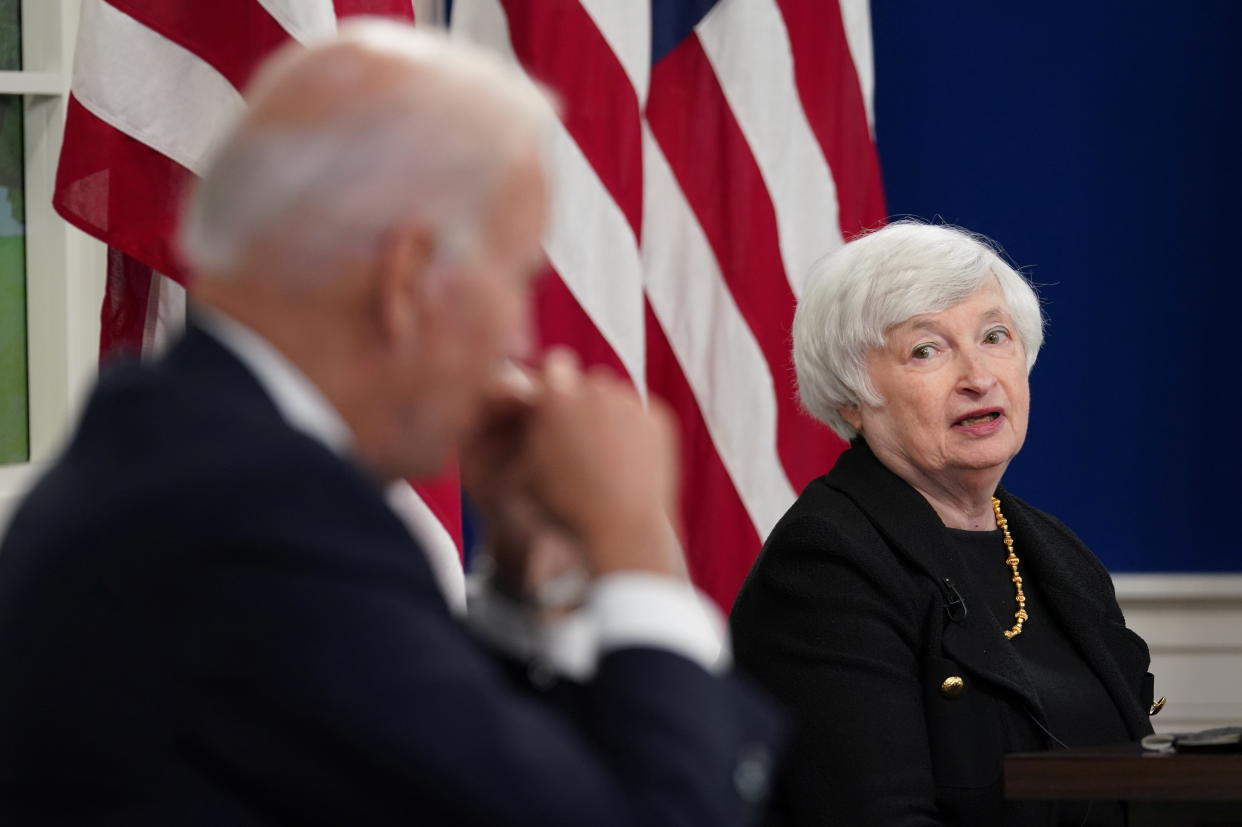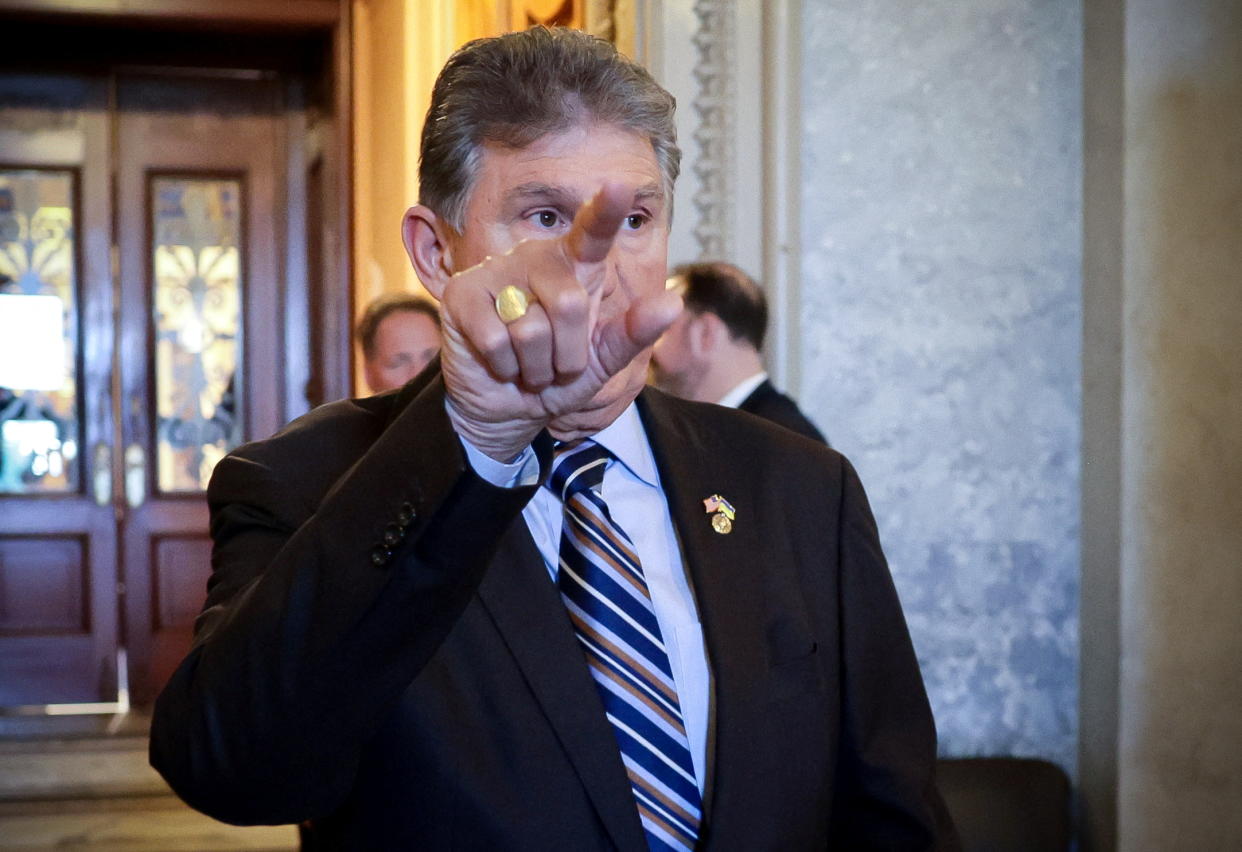What Biden is really saying about the economy
It’s Economy Month, according to the White House. As summer kicks off, President Biden and his top aides will be blitzing America with data and reassurances meant to show the U.S. economy is strong, and likely to stay that way.
The messaging crusade began with a May 30 Wall Street Journal article bearing Biden’s byline, explaining the president’s plan to fight inflation, which at 8.3% is uncomfortably high. There’s no new White House policy, but Biden wants voters to know he’s on the case. His inflation agenda has three parts: 1. Let the Federal Reserve do its job of raising interest rates to bring inflation down. 2. Pass new laws that would lower costs for families. 3. Lower the federal deficit by raising business taxes and paying down debt.
There’s nothing inherently wrong with any of these ideas, but it’s kind of a nothingburger. The Fed will do its thing with or without encouragement from the White House. Congress seems very unlikely to pass any remnants of Biden’s “build back better” legislation, which failed last year, because Democrats can’t even agree among themselves what should be in it. That includes tax hikes that could generate revenue used to bring down the deficit, though deficits in themselves are not a principal cause of inflation.
Biden advisers such as Treasury Secretary Janet Yellen and Commerce Secretary Gina Raimondo will be echoing Biden’s points during coming weeks, trying to earn Biden some cred for an economy that’s pretty solid, even with high inflation. There’s also an unstated agenda behind this messaging barrage. Here’s what Biden hopes to accomplish:

Distract people from high gas prices. The typical family spends less than 3% of its budget on gasoline, but high gas prices have an outsized effect on consumer psyches. When those two-foot-high signs at every gas station start with $4—or worse, $5—it continually reminds people something must be wrong. The average cost of gas in the United States is now above $4.60 per gallon, and prices will probably go higher as the new European embargo on Russia oil takes hold. It’s very possible many Americans will be paying $5 per gallon or more by mid-summer.
[Follow Rick Newman on Twitter, sign up for his newsletter or send in your thoughts.]
That’s bad news for millions of drivers, but this could happen at the same time other types of inflation are improving. Supply chain snafus seem to be easing. The microchip shortage is fading. Stimulus spending is largely over. These factors have been principal causes of inflation during the last 12 months, and as that inflationary pressure fades, cars, appliances, food and many other things should become more affordable. Biden wants people to notice those improvements rather than obsess over gas pain.
Get ahead of a slowdown. Few economists think the U.S. economy is heading for a recession any time soon. But job growth could slow considerably and there could be other signs of a cooldown. For one thing, that’s exactly what the Federal Reserve is trying to accomplish by rapidly tightening monetary policy—take some steam out of a hot economy so businesses and consumers cut back on spending, and receding demand brings inflation down. The runout of stimulus money could have a similar effect, since there’s no more free money for people to spend on things they may not have bought without it.
Biden referred to this coming slowdown in his Journal piece, saying monthly job creation could fall from the current 12-month average of 552,000 new jobs per month to around 150,000 per month. That lower job growth number would be “consistent with a low unemployment rate and a healthy economy,” Biden said. He’s right about that, even though it might look like a sign of impending recession if job creation falls by 75%. Half-a-million new jobs per month isn’t sustainable, and Biden is trying to preempt the inevitable Republican attacks when job growth returns to normal levels.

Make nice with Joe Manchin. Paying down the $30.4 trillion national debt has only become a Biden priority recently. That’s probably because Democratic Sen. Joe Manchin of West Virginia, who killed Biden’s BBB legislation last year by saying he wouldn’t vote for it, says he’ll only support tax hikes on businesses if some new revenue goes toward lowering the amount of government borrowing. While unlikely, there’s still a small chance Democrats could pass tax hikes and green-energy legislation this year. It will take every Democratic vote in the Senate, since Dems only have a one-vote majority. So Biden may be happy to woo Manchin with promises of debt reduction. Like everybody else in Washington, Biden certainly knows his fellow Dems are likely to lose one or both houses of Congress in the November midterm elections, meaning the next few months could be the last shot Biden has at getting any of his favored legislation passed.
Vilify Republicans. The out-of-power party is likely to have a strong showing in November simply because inflation is high and Biden’s popularity is low. Republicans don’t have to win over voters with a strong set of policies contrary to Biden’s, or prove they’d do better than he has. They just need to avoid disaster and let the familiar ebb of midterm politics, which normally punishes the president’s party, lift them back to power.
Biden is trying to remind voters that some Republicans back unpopular ideas. He refers often to a plan by Sen. Rick Scott of Florida that would require all Americans to pay at least a small amount of income tax, which would be a de facto tax hike on millions of lower-income workers. There’s no chance a Republican-controlled Congress would pass such a plan, but that doesn’t stop Biden from drawing attention to it. Biden also reminds voters from time to time that his predecessor, Donald Trump, pressured the Federal Reserve to keep interest rates low and pursued other fairly extremist goals. Trump isn’t running in 2022, but he has endorsed many candidates who are, and Biden wants voters to know they’re flirting with a return to Trumpist government. If that comes with cheap gas, maybe voters would take it.
Rick Newman is the author of four books, including “Rebounders: How Winners Pivot from Setback to Success.” Follow him on Twitter: @rickjnewman.
Read the latest financial and business news from Yahoo Finance
Follow Yahoo Finance on Twitter, Instagram, YouTube, Facebook, Flipboard, and LinkedIn
